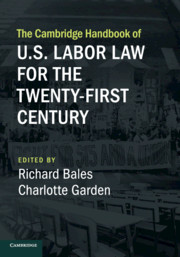Book contents
- Advance Praise for The Cambridge Handbook of U.S. Labor Law for the Twenty-First Century
- The Cambridge Handbook of U.S. Labor Law for the Twenty-First Century
- The Cambridge Handbook of U.S. Labor Law for the Twenty-First Century
- Copyright page
- Contents
- Contributors
- Preface
- Acknowledgments
- Part I Introduction
- Part II Labor Law Is Out of Date
- 3 Yesterday’s Labor Law and Today’s Challenges
- 4 The National Labor Relations Board in the Twenty-First Century
- 5 Beyond the Race to the Bottom
- 6 Union Rights for All
- 7 Public Sector Innovations
- 8 Combatting Union Monopoly Power
- 9 The Case for Repealing the Firm Exemption to Antitrust
- 10 Make Labor Organizing a Civil Right
- Part III The “Fissured” Workplace
- Part IV Barriers to Forming a Collective Bargaining Relationship
- Part V Barriers to Bargaining a Good Contract
- Part VI Unions, Civil Society, and Culture
7 - Public Sector Innovations
Valuing Voice
from Part II - Labor Law Is Out of Date
Published online by Cambridge University Press: 01 November 2019
- Advance Praise for The Cambridge Handbook of U.S. Labor Law for the Twenty-First Century
- The Cambridge Handbook of U.S. Labor Law for the Twenty-First Century
- The Cambridge Handbook of U.S. Labor Law for the Twenty-First Century
- Copyright page
- Contents
- Contributors
- Preface
- Acknowledgments
- Part I Introduction
- Part II Labor Law Is Out of Date
- 3 Yesterday’s Labor Law and Today’s Challenges
- 4 The National Labor Relations Board in the Twenty-First Century
- 5 Beyond the Race to the Bottom
- 6 Union Rights for All
- 7 Public Sector Innovations
- 8 Combatting Union Monopoly Power
- 9 The Case for Repealing the Firm Exemption to Antitrust
- 10 Make Labor Organizing a Civil Right
- Part III The “Fissured” Workplace
- Part IV Barriers to Forming a Collective Bargaining Relationship
- Part V Barriers to Bargaining a Good Contract
- Part VI Unions, Civil Society, and Culture
Summary
Collective bargaining in the public sector is under attack. Since 2011, numerous states have eliminated or severely curtailed public employee collective bargaining. For example, Oklahoma repealed its statute that provided collective bargaining rights for employees of mid-sized cities. Tennessee repealed a statute that for more than three decades had provided collective bargaining rights for teachers. The most visible development was Wisconsin’s enactment which, among other things, prohibited bargaining on all subjects except for increases in base wages which were capped at the increase in the Consumer Price Index, prohibited dues checkoff, and required that exclusive bargaining representatives undergo annual elections and receive the votes of at least 51 percent of all employees in the bargaining unit to remain certified. In 2017, Iowa followed Wisconsin’s model, prohibiting dues check-off, requiring annual recertification elections, and making base wages the only mandatory subject of bargaining, but not prohibiting bargaining on other subjects.
- Type
- Chapter
- Information
- Publisher: Cambridge University PressPrint publication year: 2019
- 1
- Cited by

